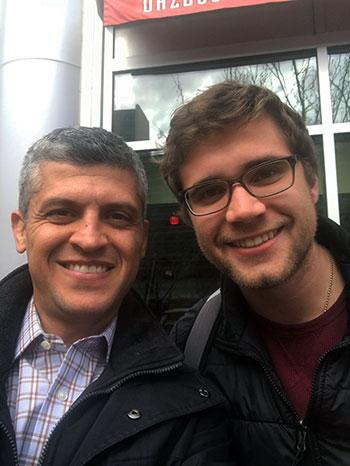FirstUp Program for First-Generation Medical Students
Alumni and faculty mentors offer practical adviceThe CU School of Medicine Office of Diversity and Inclusion has launched the FirstUp Program to support first-generation medical students.
By Devin Lynn
 (April 2019) In medical schools around the country, first-generation medical students
are often underrepresented. They tend to be older and have more
pressures related to family and finances. They also often lack deep
knowledge of academia and are unfamiliar with the steps necessary to
become a physician.
(April 2019) In medical schools around the country, first-generation medical students
are often underrepresented. They tend to be older and have more
pressures related to family and finances. They also often lack deep
knowledge of academia and are unfamiliar with the steps necessary to
become a physician.
To help these students, the FirstUp Program pairs them with mentors who help them along their medical school journey. This program was modeled after programs at Stanford University, Brown University, and the University of Southern Florida. In its first year at CU School of Medicine, more than 20 students requested mentors.
“The FirstUp Program is demand-driven because our students requested it, so to me that demonstrates both a demand and a responsibility,” said Regina Richards, director of the Office of Diversity and Inclusion. “We want to make sure our students are their best personal and professional selves.”
In fall 2018, 13 mentorships were formed. The mentors are alumni, faculty and medical leaders who want to give back to the CU School of Medicine.
“I’ve participated in mentoring since I was in college, and working with first-generation students was something I identified with,” said Assistant Professor of Anesthesiology Anthony Oliva, MD, PhD. “I was the oldest of my siblings, my parents didn’t go to college, so I can identify with some of the issues in being the first of my family to attend medical school.”
Mentors help students prepare for board exams and apply for residency.
Each student-mentor relationship largely depends on the needs and questions of individual students. In each mentorship, the method of communication and timing of meetings vary to give both mentors and mentees flexibility.
“We meet every other month for lunch or coffee and I give him advice along the way,” said Oliva, who graduated from the CU School of Medicine in 2009 and completed his residency in anesthesiology at the University of Colorado Hospital. Oliva’s mentee, Troy Kincaid, is originally from the Chicago area and had concerns about moving to a new state.
“I was nervous to move 1,000 miles away from home to attend medical school,” said Kincaid. “I didn’t know what to expect, and my mentor can talk to me about school and personal issues that come up. It has been really helpful as I adjust in my first year of medical school.”
In the months since Oliva started mentoring, a common theme has emerged. As first-year medical students start classes, they are often under intense pressure to join clubs and engage in other aspects of the CU School of Medicine.
“I want Troy to choose activities that he can fully participate in – not just add another line to his resume,” said Oliva.
“I told Troy to pick activities that are rejuvenating – something that isn’t a hassle,” said Oliva.
The FirstUp Program strengthens the collaborative nature of the CU School of Medicine by encouraging partnerships between students and alumni in the field. “I’m hopeful that this program continues to expand and make an impact. It is a great way to stay connected with CU,” said Oliva.